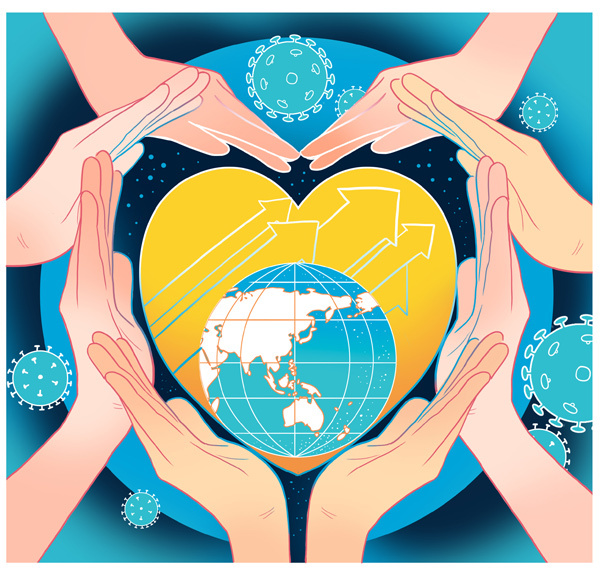
China Daily
The world today is grappling with great and compounded challenges, with the coronavirus ripping through the planet, acts of unilateralism and bullying threatening to demolish the international order, and protectionism suppressing the possibility of a strong and swift global economic recovery.
To master those turbulent transformations, the world community demands not only a strong and coordinated global response, but also responsible major countries that can take the lead in tempestuous storms.
Firstly, major countries should play a crucial role in producing and providing more global public goods.
The still-roaring pandemic has sounded an alarm that the world is suffering from an inadequate supply of global public goods.
In fact, that shortage well predates the outbreak amid reckless practices of unilateralism and exceptionalism that are undercutting the world's campaign to mitigate climate change, boost nuclear non-proliferation and bolster sustainable development.
And on COVID-19 vaccines, the last thing the world wants is vaccine nationalism that risks turning the research and development and distribution of the ultimate weapon against the cunning virus into a you-win-I-lose zero-sum game.
As a major country, China has repeatedly made it clear that once it has developed a COVID-19 vaccine and put it into use, it will be made a global public good available to all countries and all peoples.
Secondly, major countries should act as the ballast for world peace and key booster of global common development. They should not seek self-interest at the expense of the interests of others or deny other countries their right to development.
Seventy-five years ago, humanity emerged from an unprecedented scourge of war. Since then, peace and development have remained the trend of the times.
Surely the world is now confronted with serious challenges caused by ever growing global deficits of governance, trust, peace and development. Major countries should pool their efforts in fixing existing global problems, rather than causing new conundrums or stoking confrontations.
Stuck in the zero-sum mentality, some Western scholars assert that the so-called "Thucydides' trap" is inevitable. China, however, believes that in an era of globalization, where the fates of all countries are closely connected and their interests deeply intertwined, the law of the jungle or the game of power politics should give way to building a community with a shared future for mankind.
Beijing will continue to stay firmly on the path of peaceful development, and work with other countries to oppose the narrow-minded approach that puts one country's interests above all others.
Last but not least, major countries should play a leading role in upholding multilateralism and improving global governance so as to steer global development in the right direction.
Multilateralism has been the foundation for the current international order and system with the United Nations at the core in the post-war era. And it has been an ever-expanding global consensus that global issues, such as climate change and terrorism, must be tackled through extensive consultation rather than dictated by one country or a few.
In recent years, however, the international community has been wrestling with the rise of trade bullyism, abuse of unilateral sanctions and national-security maximalism, which has eroded the multilateral foundation of global governance.
Unilateralism is a dead end. No country, no matter how big or powerful, has the right to dominate global affairs, control the destiny of others, or keep advantages in development all to itself.
Every country has a stake in building a stable and prosperous world. With their global influence, major countries should lead by example in stepping up their support for the World Health Organization and the World Trade Organization, among others, as well as their commitment to the UN-centered international system.
They should champion free trade and build an open world economy; they should rally the fight to narrow the widening wealth gap by electrifying common development; and they should work even more closely to battle the arduous global challenges, the raging pandemic in particular.
The world will never return to the age of isolation. Major countries should always choose the heavy responsibility for the common causes of humanity over waving their big bullying fists. That should be the only litmus test for their greatness in the post-pandemic era.


